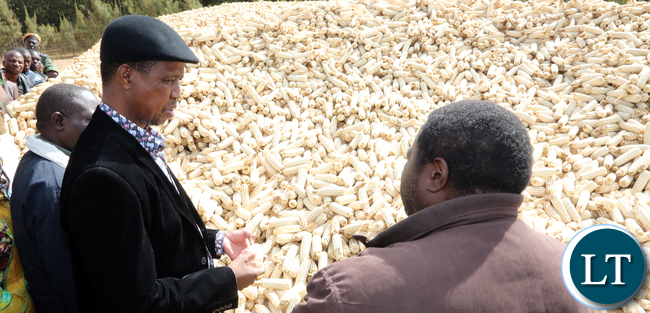
By Kakoma Calvin Kaleyi
It is well documented that Zambia should be the hub of grain production in the region. The soils are well suited and the yields capable of being attained in this country are next to none. For example, in Mpongwe yields are as high as 9.5 metric tons per hectare and 9 metric tons per hectare for maize and wheat, respectively.
On the other hand, despite the natural resource endowments in support of grain production, the country remains at a stage of merely satisfying domestic requirements with minimal exports attained.
We read the article in the Daily Nation of Monday 1 st February 2021 under the heading; “Value addition key to cracking foreign markets – Saasa” with keen interest and were disappointed.
While we agree that value addition is important to improving foreign exchange earnings of a particular commodity, there is a compelling case in favour of export of grain for Zambia.
Further, it must also be appreciated that it is a demand that drives production and Zambia is surrounded by sovereign countries with peculiar industrial capacities. Some have milling capacities while others do not. Therefore, it is worth noting from the onset that the policy to mill all grain in Zambia would not strike maximum benefits for the grain industry nor the country. This is primarily because of not only the limited capacity to crush or mill all its grain for both domestic and export purposes but also because the value-added products have limited shelf life in some cases e.g., roller meal plus the fact that demand in the export markets is not homogeneous.
In short, grain exports given its demand provide an added lucrative avenue to earn FOREX and can be a relief for excess production. Therefore, grain exports should be encouraged as this incentivizes the sector and has potential to increase domestic production to carter for local manufacturing needs and grain export utilization.
A model that seeks to promote value addition ONLY by curtailing grain exports in the hope that all production will be channelled to processing of finished products is misplaced, short sighted and must be rejected as this is what suppresses producer prices. Farmers need export parity prices to be incentivised to produce more. Grain exports are potential sources of FOREX in addition to earnings realized from finished products like edible oil, wheat flour, stock feed, and mealie meal which are processed from soya bean, wheat, and maize grain, respectively.
The attractiveness of grain exports, globally, lies in the potential for multiple industrial use and this is the reason why even developed countries, from the west to the east, still promote grain exports.
So long as the export market continues to demand for grains there is no need to entertain policies that will, in the end, cut production and reduce farmer alternative markets.
In short, why change a win-win formula? There is no room for such one-sided policies in Zambia. The Grain Industry Stakeholders speak with one voice through industry consensus positions. What we desire most to propel grain production is the lifting of maize and mealie meal export bans by the Government.
The Author is the Media and Public Relations Manager for the Zambia National Farmers Union


I agree with the author.
A t a s e! Bu Catholic father bwa ku t o m b a tukampenga p a m a t a k o… am not suprised that he spews diarrhea from his dirty stinking mouth.
Fuseke you tribal goat
This is too boring for a Friday. Lusaka times on Friday’s atleast publish some less formal articles to get people ready for weekend. For example publish something on relationship problems
How can we be the hub of grain production when we have lazy leaders who think handing out cash every five years is empowerment…a lazy President who has never put in a full shift.
All this post about Mr KYAUTA Jonathan is true, I invested $500 all was successful after 24 hours of trading, I received a profit of $6000 and I use this opportunity to reach everyone who is looking for a legit manager, click on the link below to send him direct message?????
https://www.facebook.com/kyauta.jonathan
Industrialization is the engine of economic growth and job creation. Industries need to process raw materials for the purpose of raising turnover for companies. There is nothing wrong with selling unprocessed raw crops and livestock or fish. At the same time, selling sausages and minced meat can contribute to financial stability for companies. Even as we are talking about processing raw cash crops, millers on the Copperbelt have found a ready market in neighboring countries. Buyers pay using American dollars. Sellers supply bags of roller meal, bags of breakfast meal, loaves of bread and other marketable commodities. When a customer needs flour, then it is also alright. When a customer needs local buns, hen that is also alright. Take time to rebuff technical advice. Take time to request…
Yes ECL now and beyond
I agree with author
Ecl is wise. All we need to do as Zambians is to weed out the bad seeds in parliament and local government. We got a good listening leader.
Vote wisely on the grassroot.
Iam a catholic I strongly condemn rigging of elections.Father Lupupa must repent.He is actually a true father because we know he has 2 children with a girl in chipata.We can reveal here that this wolf in ship skin is actually renting a house for this young lady in Chipata’s New Moth extension.
FYI Russia aNd Ukraine are two of the largest wheat exporters in the world and when did you last buy processed flour in picknpay ot shoprite that came from there? Never! But go to your bakeries an ask the owners where they are buying the wheat from? They will tell you its coming from those two countries.
Comments are closed.